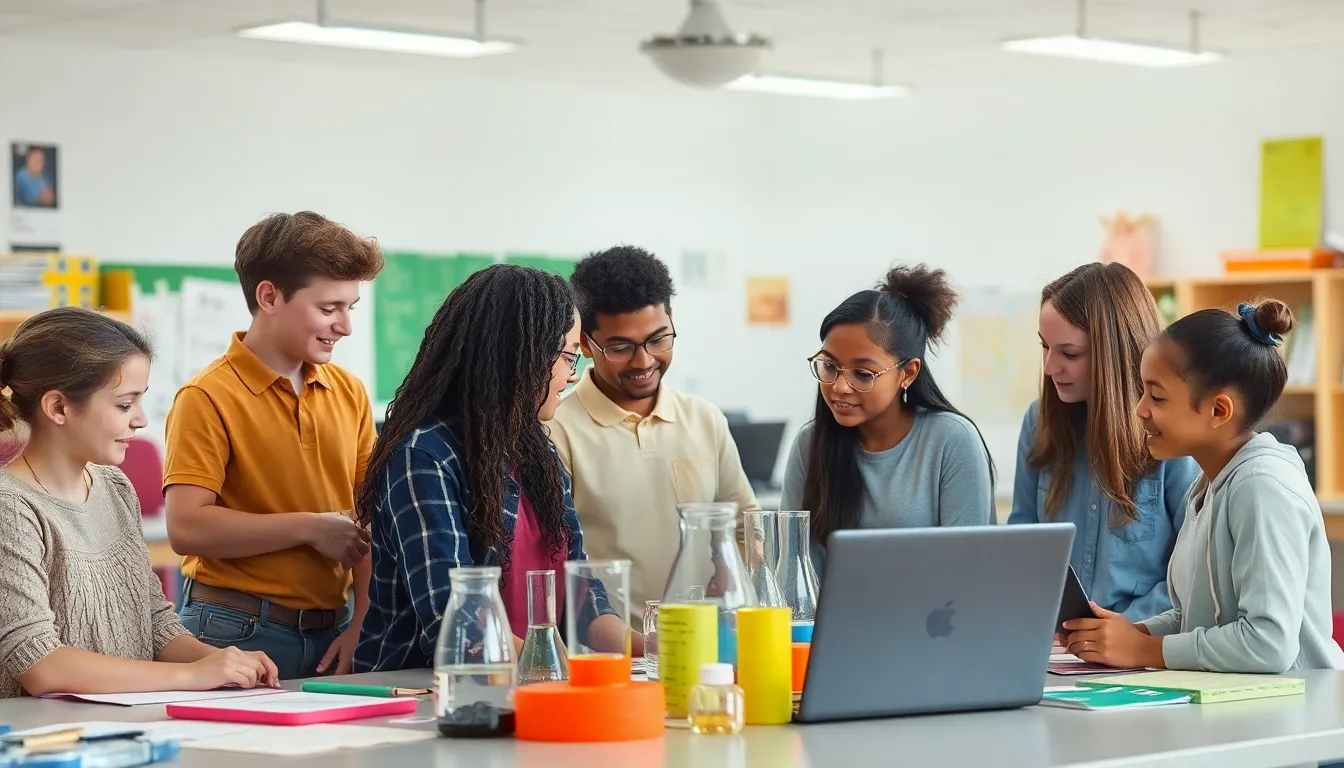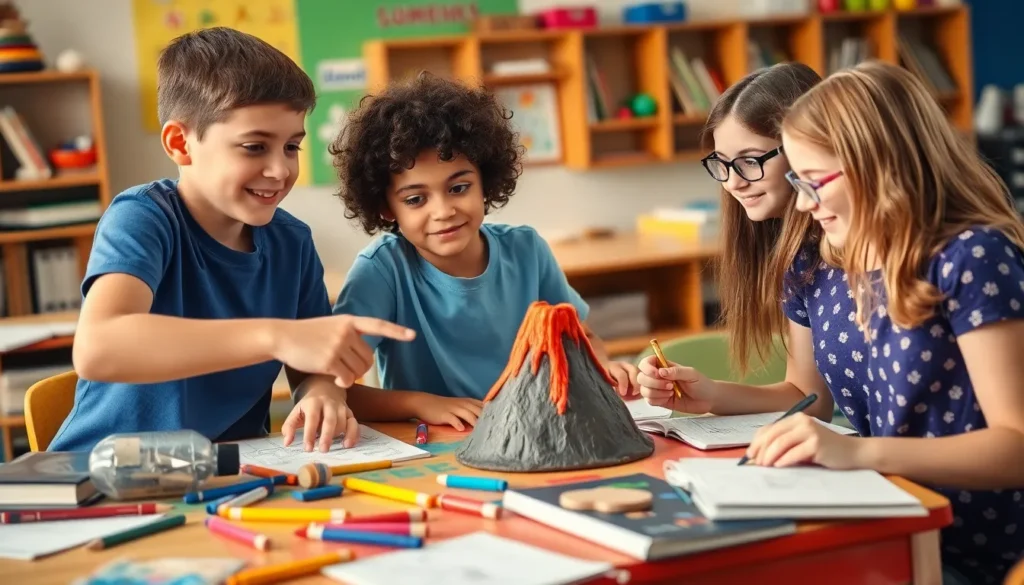School projects can feel like a rite of passage for students, a mix of creativity and chaos that often leads to unforgettable memories. Whether it’s the thrill of building a volcano that actually erupts or the panic of last-minute poster board runs, these projects can spark both excitement and anxiety. They’re not just assignments; they’re opportunities to unleash imagination and learn valuable skills.
Table of Contents
ToggleOverview of School Projects
School projects serve as integral components of educational experiences. These assignments encourage students to engage with various subjects in innovative ways. They promote critical thinking, teamwork, and problem-solving skills. Creativity often flourishes during project work, allowing students to explore concepts beyond traditional classroom settings.
Building models is a common example of hands-on involvement in science classes. Students might create a functioning model of the solar system or simulate ecosystems. Art projects, such as creating murals or sculptures, offer another avenue for artistic expression. Those projects not only enhance creativity but also improve fine motor skills.
Time management becomes essential when students juggle multiple projects. While some learners thrive under pressure, others may find the challenge daunting. It’s crucial to allocate time effectively, balancing research, creation, and presentation phases. Teachers often encourage planning to reduce last-minute stress.
Students also benefit from collaborating on group projects. Communication and cooperation skills increase as they navigate different viewpoints and divide tasks. These group dynamics can enrich learning environments and foster lasting friendships.
Feedback plays a vital role in the learning process. Receiving constructive criticism can guide improvements and enhance future projects. Students who engage in peer reviews often gain valuable insights into their work.
Overall, school projects are not merely tasks; they are transformative experiences that shape educational journeys. Emphasizing practical application and collaborative efforts cultivates essential life skills, preparing students for future endeavors.
Types of School Projects

School projects can be classified into various types, each serving a unique purpose in the educational experience.
Individual Projects
Individual projects allow students to explore topics independently. Creativity shines as students have the freedom to choose subjects that interest them. Examples include writing essays, creating artwork, or designing presentations. These projects encourage self-directed learning and build research skills. Students often discover personal strengths while managing their own work. Feedback from teachers aids in refining ideas, enhancing understanding, and improving future performance.
Group Projects
Group projects foster collaboration among students. They provide opportunities to tackle complex tasks as a team, blending diverse skills and perspectives. For instance, students might work together on science experiments, presentations, or community service initiatives. This type of project emphasizes communication and cooperation. While working in groups, students learn to negotiate roles and responsibilities. Overall, teamwork cultivates social skills essential for future collaboration in diverse environments.
Research Projects
Research projects focus on in-depth investigation of specific topics. Students identify questions, gather data, and analyze information to draw original conclusions. Common examples include conducting surveys, creating experiments, or exploring historical events. Such projects enhance critical thinking and analytical abilities. Educators often encourage the use of various resources, teaching students effective research methods. Additionally, presenting findings helps develop public speaking skills and instills confidence in sharing knowledge.
Benefits of School Projects
School projects offer numerous advantages that enhance educational experiences for students.
Skill Development
Engagement in school projects cultivates various skills crucial for academic and personal growth. Problem-solving abilities improve as students navigate challenges during project execution. Critical thinking is fostered when students analyze information and make informed decisions. Creativity flourishes as projects encourage innovative expression in unique ways. Research skills become refined, equipping students to gather and synthesize valid information effectively. Time management skills also develop as students balance project demands with other responsibilities. Students learn to prioritize tasks and meet deadlines successfully.
Teamwork and Collaboration
Collaboration plays a pivotal role in group projects, enhancing students’ ability to work together. Communication skills sharpen as students share ideas and constructively debate viewpoints. Learning how to compromise becomes essential, as differing opinions arise. Trust builds within teams, fostering stronger relationships among peers. Responsibility is emphasized as members depend on each other to complete tasks. Group projects also create opportunities for students to leverage diverse strengths within the team. Effective collaboration prepares students for future work environments where teamwork is often a key component.
Challenges in School Projects
School projects present various challenges that can impact students’ learning experiences. Understanding these challenges helps students navigate educational demands effectively.
Time Management
Students often encounter difficulties with time management when balancing multiple projects. Balancing various assignments can lead to stress, especially during peak periods like midterms or finals. Some thrive under pressure, while others may find it overwhelming. Successful planning includes breaking tasks into smaller, manageable steps, allowing for organized progress. Prioritizing deadlines aids in avoiding last-minute rushes and ensures all components receive adequate attention. Tools like calendars and checklists enhance tracking and accountability, fostering better management of time during school projects.
Resource Limitations
Limited access to resources can hinder project success for many students. Budget constraints or insufficient school supplies may restrict the scope of creative ideas. Inadequate access to technology can also impede research capabilities. Schools can support students by providing necessary resources, including libraries and materials relevant to projects. Collaboration can alleviate resource limitations, as group members often pool their resources together. Encouraging creative solutions, such as recycling everyday items for projects, fosters ingenuity. Addressing these limitations helps transform obstacles into valuable learning experiences.
Best Practices for Successful School Projects
Success in school projects hinges on effective planning and organization along with strong communication skills. Implementing these best practices sets the foundation for a fruitful project experience.
Planning and Organization
Start by breaking down the project into manageable tasks. Creating a timeline helps students track progress and meet deadlines. Organizing materials ahead of time fosters efficiency during project execution. Utilizing calendars or planners allows for better time management. Establishing clear goals encourages focused efforts, ensuring each participant contributes meaningfully. Tracking tasks with checklists helps prevent last-minute scrambling. Prioritizing tasks according to deadlines and importance enhances overall productivity. In sum, a structured approach minimizes stress and maximizes results.
Effective Communication
Clear communication forms the backbone of successful school projects. Establishing group roles clarifies responsibilities from the outset. Regular check-ins ensure everyone stays on the same page and allows for addressing issues promptly. Sharing ideas openly encourages creativity and fosters collaboration. Utilizing digital tools, such as messaging apps or project management software, simplifies communication. Actively listening to peers promotes respect and understanding, strengthening team dynamics. Providing constructive feedback contributes to continuous improvement. In short, prioritizing communication enhances teamwork and project outcomes.
School projects are invaluable experiences that shape students’ educational journeys. They foster creativity and critical thinking while promoting essential life skills like teamwork and time management. Through various types of projects, students learn to navigate challenges and develop confidence in their abilities.
These assignments not only enrich academic learning but also provide opportunities for personal growth. With effective planning and collaboration, students can overcome obstacles and transform their ideas into tangible outcomes. Ultimately, school projects prepare students for future endeavors, equipping them with the skills needed to succeed in both their academic and professional lives.

